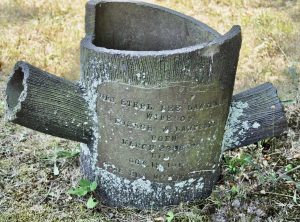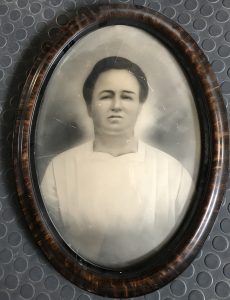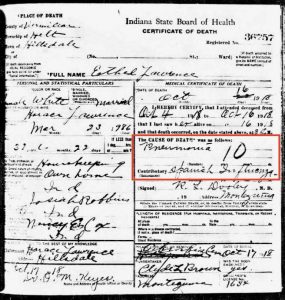Our Ancestors and the 1918 Spanish Flu
So… we’re all locked down, to various degrees, in a worldwide effort to help stop the spread of the novel COVID-19 Coronavirus. And everyone knows that this 2020 pandemic is the worst thing since the 1918 Spanish flu pandemic.
From Wikipedia: The Spanish flu was an unusually deadly influenza pandemic. Lasting from January 1918 to December 1920, it infected 500 million (estimated) people—about a quarter of the world’s population at the time…resulting in 50 million (estimated) deaths.
Here is a peek into the lives of ancestors who lived and died during the 1918 Spanish flu pandemic. Click To Tweet
Many of us who research our family histories know which of our ancestors died during that time, and what effects it had on their families.
Ethel Lee Robbins Lawrence (1887–1918)
My maternal great-grandmother, Ethel Lee Robbins Lawrence, died at the age of 31, leaving my 14-year-old grandmother, Villa, to raise her three younger brothers and two-year-old baby sister almost single-handedly.
According to Villa (who died in 1986 at the age of 82), her father was “a drunkard and a rent jumper”. He worked seven days a week at a “drain tile” factory (they made clay sewer pipes) for low wages, and at night would go to sweep out the local saloon, where he was well-liked and well-supplied with liquor.
Villa recalled:
I can’t remember my Dad ever paying a doctor bill or rent. We lived in almost every house in that little town. When the rent piled up we got notice to move. Now I marvel that we always had another house to move to.
By contrast, her mother was “a very happy and religious person” who “whistled and sang church hymns all the time at her work of cooking, sewing, washing, scrubbing, and ironing.”
‘Get an education’ was the guide of my life. Mother said, ‘I want you to have an education so you won’t have to work as hard as I did.’ She had to hoe, sucker, and worm tobacco in the field from the time she could remember.
The Spanish flu targeted young adults
Villa, on the Spanish flu:
Mother was seven months pregnant for the seventh time. The flu was taking all pregnant women, so she knew she was doomed. While Mother was sick, I was begging for a fountain pen from the catalog. They were new and I was always wanting something. She told me I wouldn’t need it. That she was going to die, and she wanted me to quit school, keep house, and keep the family together.
Ethel did die, leaving her 14-year-old daughter to take care of her three younger brothers and two-year-old baby sister. But Villa did also continue her education and, with the help of her mother’s sister, was able to care for the children and see that they, too, went to school. Villa became a teacher, and, later, a nurse. Forced to grow up fast, she rose to the challenge, and not only survived, but thrived. She deserves a story of her own!

“Gone but not forgotten.” Ethel’s gravestone, made out of clay sewer pipes, in Arabia Cemetery, Mecca, Indiana.
A cemetery surprise
Meanwhile, Arabia Cemetery, in Mecca, Indiana, is tucked between a country road on one side, and separated from a cow pasture by a wire fence on the other side. This is not a place with groomed lawns, neat rows, pathways, or offices. There is barely room to park your car, but the parking and graves are on a little bluff, separated from the road just enough to be quite peaceful.
When I found Ethel’s grave, I was surprised – and oddly touched — to see that her gravestone was a hand-made sculpture of a tree trunk…. made out of clay sewer pipes.
What I’ve learned of cemetery symbology tells me that a tree trunk represents being cut down in the prime of life. Did Horace know that? Was it just the cheapest thing he could manage on her behalf – free (?) clay sewer pipes from his workplace? Or, was it a very deliberate, loving, and creative tribute? A combination, I imagine.
Spanish flu resources
As for how other families fared, here are some resources:
Podcast by genealogist Amy Johnson Crow: What Life Was Like During the Spanish Flu of 1918
Article: A Tale of Two Cities: The Catastrophic 1918 Flu Pandemic Can Guide City Policymakers Today – tells the story of how differently St. Louis and Philadelphia handled the Spanish flu, in terms of social distancing, and their vastly different outcomes.
Article: Ten Myths About the 1918 Flu Pandemic from Smithsonian magazine.
Finally, to help YOU (and me) — here and now — here is a link to the Org4life Survive & Thrive Resource Roundup (which I am frequently updating during my own isolation).
Do you have ancestors who died in the 1918 Spanish flu pandemic?
Please share in the comments below!
—————————————————————————
Copyright 2020 by Hazel Thornton, Organized for Life.
I welcome social media links directly to this page!
Please contact me for other types of reprint permission.
—————————————————————————
Share this:






My grandfather, my father’s father, died in that epidemic. He was a healthy young man, a recent immigrant from Ukraine, along with his wife. They had two sons — my uncle, who was four at the time of grandfather’s death, and my father, who was an infant. When her husband passed, my grandmother — alone in the U.S. and not having much command of English — marshaled her resources and made an arduous journey back to Ukraine. She took her infant, my father, with her, but left her older son to be raised by friends in New York City. My father was raised in a small village outside Kiev, where most of the population were subsistence farmers. He only made it back to the U.S. (where he was technically a citizen by birthright) after World War II… and *that* is a long story for another day. It always confused people to hear my dad speak (because he had a heavy Ukrainian accent) to learn that he was born in the U.S. To say the flu epidemic changed *his* life is a dramatic understatement. I imagine that several generations down the line, our grandchildren and their children will be hearing Covid-19 pandemic stories.
Wow, that must have been a tough decision for your grandmother to make, to leave her 4 year old son in the U.S. with friends. Thank you for shraing your story!
My mothers mother died in late 1917 in an area of Kansas where the Spanish Flu took many. We have not searched for the death certificate, but I suspect she died from this flu epidemic. We have been told that she died from child birth. Could have been both.
Late 1917 is pretty close to when they say the Spanish Flu started (early 1918). So, depending on what the death certificate says (if it exists), you could be right. As you probably know, it wouldn’t necessarily say Spanish Flu even if it was 1918 and that was the contributing cause. It might say pneumonia or something similar. So she died when your mom was a baby! Didn’t know that. What was her name?
I cringed at “7 months pregnant with her 7th child.” I cannot image that. Our ancestors were either hearty or they didn’t make it, right? Both my sister and I were sickly kids, and I remember my mother telling me that she said to her pediatrician in desperation, “What are we doing wrong?” The doctor said, “You aren’t doing anything wrong. 100 years ago you would have had six or more children, two of them would have survived… and it just wouldn’t have been these two.” I didn’t know that about a “tree-shaped” grave marker either. Very interesting!
Speaking of which… it wasn’t until you mentioned “7th child” that I realized I’d left poor little Clifford out of this version of this blog post. (Not that I named the other chidren either.) I always thought he was the child who died at the same time Ethel did. But his death certificate says he died 3 years earlier, at age 1. This unborn child never had an ultrasound, or a name…or a record of any kind (that I have found) other than my grandmother’s words on the subject. (Which I had forgotten I had.)
So glad you and your sister survived, Seana!
Hazel, this is not the first time you’ve piqued my interest in an aspect of my family history that I never thought about. Something new to investigate!
What a beautiful story! I had different death stories on my grandma’s family in Italy, but I don’t think it was related to the Spanish flu or they didn’t know. It’s great you were able to document this experience from long ago. I treasure all the stories I recorded from my long passed grandmothers and parents. Thank you for sharing.
The when and where is a bit fuzzy, but I’m reasonably sure that my great grandfather, Wolf Greenspan, died from the Spanish flu. My grandmother (his oldest child,) Estelle, also contracted the flu, but she survived. She was probably a young teenager and was left to care for her three younger brothers so that her mother could work to support them. I adored my grandmother. If she hadn’t survived, my mother, aunts, me, my sisters and brothers, and our children wouldn’t be in this world. I am so grateful that she did survive. She was a strong, amazing, very loving woman. I’m also thankful that she lived a relatively long life. She passed away when I was 25.
My grandmother’s sister from
N.C. My grandmother spoke often of her sister dying from the Spanish flu, however, she didn’t tell me her sister also lost her husband to the same flu. They died within four days of one another leaving behind a two year old daughter. I often wonder why she left that part out. It wasn’t until I was tracing family history and came across what was the little girl’s obituary who lived and died of an old age and I recognized the names of relatives in her obituary. I often wonder if my grandmother’s sister and husband were aware that the other had passed or did family members keep it from the other perhaps in fear it would may make the other worse or maybe they just knew they were both going to pass because both were so sick. Maybe both were unconscious. So many questions left unanswered so I can only wonder.
So many stories from that time. Glad you found the missing family members you didn’t even know about!